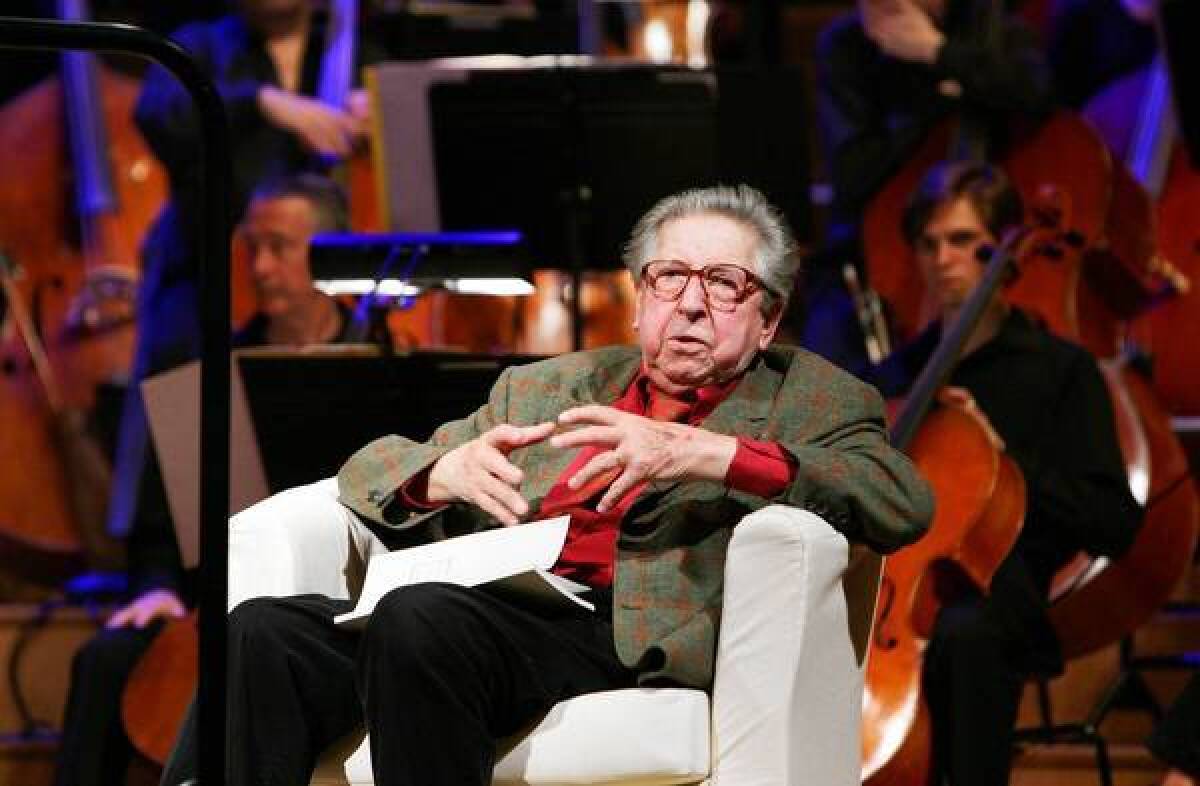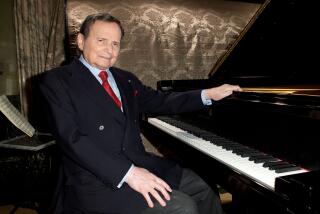PASSINGS: Henri Dutilleux, Harold Shapero, Vernon McGarity

Henri DutilleuxFrench composer of modernist music
Henri Dutilleux, 97, a highly regarded French composer of modernist music, died Thursday in Paris, said his publisher, Schott Music. The cause was not given.
Considered one of the most important composers of the 20th century, Dutilleux received international acclaim, and his music is performed regularly by major orchestras. He wasn’t a prolific writer, but his style, singular voice and iconoclastic tendencies won him admirers around the world, inviting comparisons to Pierre Boulez and Olivier Messiaen.
Among Dutilleux’s best-known works were his Piano Sonata; “Figures de Resonances” and “Ainsi la Nuit” for chamber groups; “Timbres, Espace, Mouvement” and cello concertos written for Mstislav Rostropovich; and “L’Arbre des Songes,” a violin concerto created for Isaac Stern.
In 2011, Gustavo Dudamel chose the violin concerto translated as “The Tree of Dreams” to replace an unfinished commission for a Los Angeles Philharmonic performance. Times music critic Mark Swed wrote, “You can never go wrong with Dutilleux” and called him “a refined, eloquent composer.”
Born Jan. 22, 1916, in Angers, France, Dutilleux grew up in an artistic home. A great-grandfather was a printmaker who was a friend of the French painter and printmaker Jean-Baptiste Camille Corot. A grandfather was a music teacher.
Dutilleux studied at the Paris Conservatory and, after serving in World War II, became a pianist and music teacher and arranger while developing as a composer. He married pianist Genevieve Joy in 1948 and wrote many pieces for her.
Harold Shapero
Pianist, composer taught at Brandeis
Harold Shapero, 93, an American composer and pianist who was associated with the neoclassical style of music, died in his sleep May 17 in Cambridge, Mass. He had pneumonia, according to Brandeis University, where he had taught for 37 years.
As a composer, Shapero was a critically admired artist though never a household name. He has been widely categorized as a neoclassicist — a rubric of composer that flourished in the mid-20th century and that sought a return to the aesthetics of classicism.
Leonard Bernstein conducted the premiere of Shapero’s best-known work, 1947’s “Symphony for Classical Orchestra,” with the Boston Symphony Orchestra.
In 1986, Andre Previn and the L.A. Philharmonic performed it at the Los Angeles Music Center’s Dorothy Chandler Pavilion and at Segerstrom Hall in Costa Mesa as part of a program to revive neglected pieces of American music.
“Shapero reveals himself here as a superb craftsman. ... The writing is clever, subtle, elegant,” Times critic Martin Bernheimer wrote in his review.
Shapero was born April 29, 1920, in Lynn, Mass. He studied music at Harvard University and in the 1940s was a regular presence at the MacDowell Colony, a prestigious arts retreat in New Hampshire.
He joined the Brandeis faculty in 1951 and helped to pioneer its electronic music studio while also teaching music theory and composition.
Vernon McGarity
Won Medal of Honor for Battle of the Bulge
Vernon McGarity, 91, a former World War II Army squad leader who received the Medal of Honor for valor displayed during the Battle of the Bulge, died of cancer Tuesday in Memphis, Tenn., said a spokeswoman for Memorial Park Funeral Home and Cemetery.
President Truman awarded the Medal of Honor to McGarity in October 1945.
According to the U.S. Army Center of Military History, McGarity was a technical sergeant in the 393rd Infantry, 99th Infantry Division, during World War II.
Wounded in an artillery barrage that preceded a German counteroffensive near Krinkelt, Belgium, in December 1944, he received treatment but refused to be evacuated and returned to battle.
During the battle, McGarity rescued two wounded soldiers, immobilized a tank with a round from a rocket launcher, replenished the unit’s ammunition under heavy fire and destroyed a German machine gun.
The machine gun had cut off the squad’s only escape route, but McGarity managed to destroy it single-handedly under heavy fire and kill or wound all the German gunners, according to his Medal of Honor citation.
The delaying action allowed reserves to assemble and form a line against the Germans.
McGarity received the Bronze Star, Purple Heart and two Belgian medals in addition to the Medal of Honor. There are 79 Medal of Honor recipients who are still alive, according to the Congressional Medal of Honor Society.
McGarity was born Dec. 1, 1921, in Right, Tenn., and returned to his home state after the war. He worked for the Veterans Administration and served 28 years in the Tennessee Guard.
-- Los Angeles Times staff and wire reportsnews.obits@latimes.com
More to Read
Start your day right
Sign up for Essential California for the L.A. Times biggest news, features and recommendations in your inbox six days a week.
You may occasionally receive promotional content from the Los Angeles Times.






